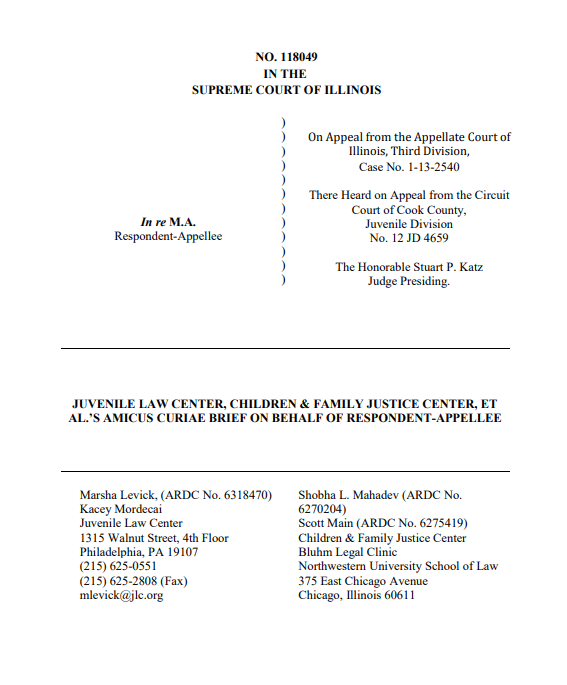
Summary of Argument
By imposing registration as a violent offender on youth without consideration of either the characteristics that distinguish youth from their adult counterparts or a youth’s individualized circumstances, Illinois’ Violent Offender Against Youth Registration Act (VOYRA) violates both state and federal constitutional guarantees of equal protection and due process because it is inconsistent with recent United States Supreme Court case law recognizing how kids are different from adults in the application of our criminal laws and constitutional provisions. See U.S. Const. Amends. V, XIV; Ill. Const. Art. 1, § 2; see e.g., Roper v. Simmons, 543 U.S. 551 (2005); Graham v. Florida, 560 U.S. 48 (2010); J.D.B. v. North Carolina, 131 S. Ct. 2394 (2011); Miller v. Alabama, 132 S. Ct. 2455 (2012).
As the site of the nation’s first juvenile court over a century ago, Illinois was the first state to establish a system that treated children differently than adults and prioritized rehabilitation over punishment. Towards that end, Illinois has shielded children in juvenile court from adult consequences, such as criminal stigma, so that children may become productive members of society. Because of the rehabilitative aims of the juvenile court, juvenile offenders are not afforded the full panoply of procedural rights that criminal defendants receive. They lack, for example, the right to trial by jury. Yet M.A. faces potential lifetime stigmatization, harm to her reputation and serious adult consequences as a result of an isolated incident in her childhood that requires her to register for ten years as a violent offender. As a result, M.A. and others in her position receive “the worst of both worlds.” See In re Gault, 387 U.S. 1, 18 n.23 (1967) (expressing concern for those in a juvenile system where the child “gets neither the protections accorded to adults nor the solicitous care and regenerative treatment postulated for children”).
The Illinois General Assembly recognized that juveniles in M.A.’s position should not be subject to a lifetime of harsh restrictions from a simple childhood incident when it amended the similar Sex Offender Registration Act (SORA), to allow for petitions to terminate registration after five years and eliminated provisions requiring juvenile sex offenders to register as adults at age 17. See 730 ILCS 150. Yet VOYRA maintains an adult registration provision and does not include any discharge provision violating juveniles’ right to equal protection.
Given the immediate and long-term harm to a child’s reputation at stake, VOYRA’s registration requirements can only stand if they provide the notice and meaningful opportunity to be heard necessary to comport with state and federal due process requirements. VOYRA does not meet this standard. The Act provides no opportunity for juveniles to rebut the presumption of their dangerousness either during the adjudication hearing, at the initial order to register, at adult registration at 17, or at the imposition of a mandatory ten-year extension if any of the Act’s strict provisions are violated. Furthermore, research and findings from the Illinois Juvenile Justice Commission show that registration of juvenile offenders neither improves public safety nor rehabilitates youth. For these reasons, Amici urge this Court to affirm the appellate court’s decision and find sections 730 ILCS 154/5(a)(2) and 730 ILCS 154/10 unconstitutional for all juvenile registrants.